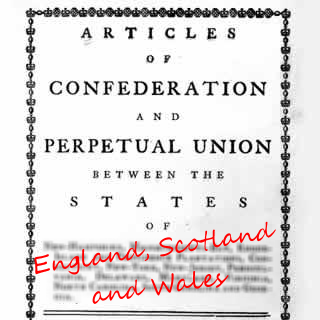I don’t find myself disagreeing with Nigel Farage very often when it comes to the EU and constitutional affairs but on the subject of the EU Commission on a Bill of Rights I completely disagree with him.
UKIP’s has made a submission to this commission slating the EU Convention on Human rights which was turned into the Human Rights Act in the UK and calling for a British Bill of Rights. Throughout the submission there is a conflation of English and British which demonstrates a fundamental misunderstanding of the constitutional laws in force in the UK which is common to all political parties and the media.
The submission is spot on in its criticism of the EU Human Rights Act which isn’t about human rights, it’s about imposing a liberal left wing ideology on the population. Human rights to any right thinking person are things like the right to life, the right to liberty, the right freedom of speech and assembly, the right not to have your possessions and money stolen on a whim and of course the most important right of all, the right to rebel. Getting married isn’t a human right, nor is the enforced religious indoctrination of children or middle aged women moving in their 18 year old Turkish husbands.

Magna Carta Memorial, Runnymede
However, the answer is not to create a new British Bill of Rights. We have an English Bill of Rights which, in conjunction with Magna Carta, the Habeas Corpus Act, the Petition of Right and the (English) Common Law, provide us with all the basic human rights we need. The problem isn’t that we don’t have enough rights, it’s with the lack of enforcement of these rights by the judiciary and the attempted usurpation of our constitution by EU laws.
Take for instance the multi-billion pound industry around the issuing and enforcement of illegal fines, fixed penalties, penalty charges or whatever new name the crooks that issue them come up with. The Bill of Rights, which is still in force, says “any promise of fine or forfeiture before conviction is illegal and void”. Having the numberplate of your car snapped by a camera does not amount to a conviction, nor does a police officer handing you a piece of paper at the roadside. You can refuse to pay and opt for a court hearing but that comes with a further penalty in disqualifying you from the reduced fee you are offered for not challenging the illegal fine and of course the promise of a fine has already been made before your court hearing and inevitable conviction which is unconstitutional and therefore illegal.
It matters not that laws have been passed since the Bill of Rights attempting to legitimise the extortion by summary justice, Lord Justice Laws established in the 2002 case of Sunderland -v- Thoburn (aka “Metric Martyrs”) that constitutional laws could not be repealed by implication and no government has yet been stupid enough to try and repeal the English constitution. Yet here UKIP is suggesting just that!
It is worth pointing out at this point that what is incorrectly referred to as the British constitution is, in fact, the English constitution, “Free Born Britons” is a mis-quoting of the term “Free Born Englishmen” that originated from the Leveller movement and the Common Law is English, not British. The English constitution also applies to Wales because Welsh law was abolished by Henry VIII and replaced with English law. Magna Carta, the Habeas Corpus Act, the Petition of Right and the Bill of Rights are English laws and don’t apply to Scotland or Northern Ireland (with one exception).
The Criminal Procedure Act brought similar rights to Habeas Corpus and Magna Carta to Scotland in 1701 but neither of the English statutes were ever applied to Scotland or Ireland. The Petition of Right applies to Northern Ireland by virtue of its application in pre-1937 Ireland but not to Scotland and there is no equivalent in Scottish law. The Bill of Rights similarly doesn’t apply to Scotland where the Claim of Right, passed by the pre-union Scottish Parliament, provides roughly equivalent rights to those contained in the English Bill of Rights. Furthermore, in the case of Sunderland -v- Thoburn, Lord Justice Laws included the Scotland Act and the Government of Wales Act in the list of constitutional laws thus establishing the principle that Wales has a distinct constitution from England..
In order to establish an all-encompassing British Bill of Rights common to all four home nations, each of the four constitutions of the four home nations would have to be brought into line with each other or abolished and replaced with this British Bill of Rights. Since putting the Scotland Act into effect in English law or the Northern Ireland Constitution Act into effect in Scottish law would be a complete nonsense, the only alternative would be to replace the existing four constitutions with a new one. So, to establish a British Bill of Rights would require the full or partial repeal of the following:
- Magna Carta
- Bill of Rights
- Habeas Corpus Act
- Petition of Right
- Claim of Right
- Criminal Procedure Act
- Scotland Act
- Government of Wales Act
- Northern Ireland Constitution Act
- Northern Ireland Act
I find the prospect of British politicians who have introduced such legislative abominations as the abolition of trial by jury, the EU arrest warrant, internment and arbitrary house arrest amending and repealing our centuries-old constitutions and drafting a new Bill of Rights quite disturbing and I would hope that 99% of the population would be equally concerned at the prospect. Magna Carta and Habeas Corpus have stood the test of time so effectively that they are in force in England, Wales, Australia, New Zealand, the USA, South Africa, Singapore, Canada and other countries around the world. If a new British Bill of Rights would give us the same rights that we already have then why do we need it? If it would give us extra rights whilst protecting the rights we already have then pass a new law giving us the extra rights and leave our existing constitutions intact.
There is no need to replace our constitutions with a British Bill of Rights because we have all the rights we need. What we need is an end to the EU usurpation of our laws and for judges in the UK to be forced to uphold our existing constitutions. If it is deemed necessary to grant the Scots and Northern Irish the same constitutional rights the English and Welsh have then pass a new law giving them to them.
Assuming the foregoing was ignored and the British government ploughed on with a British Bill of Rights, there is the fundamental problem of repealing or amending any of our shared constitutional laws in that every nation using these statutes has to agree to the change. The Magna Carta on the statute books in the USA, Canada, Australia, New Zealand, etc isn’t a copy of Magna Carta, it is the same Magna Carta as the one in force in England: there is only one Magna Carta. Would every country using Magna Carta be happy to carry out the same act of constitutional vandalism so the British government can create a British Bill of Rights?
There is a tendency amongst the political classes to believe that making major constitutional change is simply a matter of political will but it’s not. Contrary to popular belief, the British Parliament is not an all-powerful supreme law-making body. It can’t change constitutional laws that we share with other countries, nor can it ignore centuries of judgements and precedent made by judges. Creating a British of Rights would involve massive constitutional upheaval and the consent and co-operation of several other countries around the world and in all likelihood would end up depriving us of rights rather than protecting and extending what we already have, not to mention setting a dangerous precedent that our constitutions can be changed on a whim.
UKIP’s submission is wrong in both substance and concept and I hope it has been conceived out of innocent, rather than willful ignorance. It certainly shouldn’t make it into the next manifesto.




 So it’s not the right time to sort out the cause of our doom-spiralling economy, high unemployment and high cost of living but it is apparently the right time to sort out the laws governing succession to the throne to allow the monarch to marry Catholics, girls to accede to the throne ahead of boys and to remove the requirement for the monarch to authorise royal marriages.
So it’s not the right time to sort out the cause of our doom-spiralling economy, high unemployment and high cost of living but it is apparently the right time to sort out the laws governing succession to the throne to allow the monarch to marry Catholics, girls to accede to the throne ahead of boys and to remove the requirement for the monarch to authorise royal marriages.

 The powers are for the police to ban suspects from their homes. Suspects, not people who have been proven to be guilty of domestic abuse. The powers are intended to be used where there is (or is thought to be) insufficient evidence to secure a conviction. So not only are the powers to be used against people who haven’t been found guilty of committing a crime but they are to be used when there is a lack of evidence that any crime has been committed.
The powers are for the police to ban suspects from their homes. Suspects, not people who have been proven to be guilty of domestic abuse. The powers are intended to be used where there is (or is thought to be) insufficient evidence to secure a conviction. So not only are the powers to be used against people who haven’t been found guilty of committing a crime but they are to be used when there is a lack of evidence that any crime has been committed.